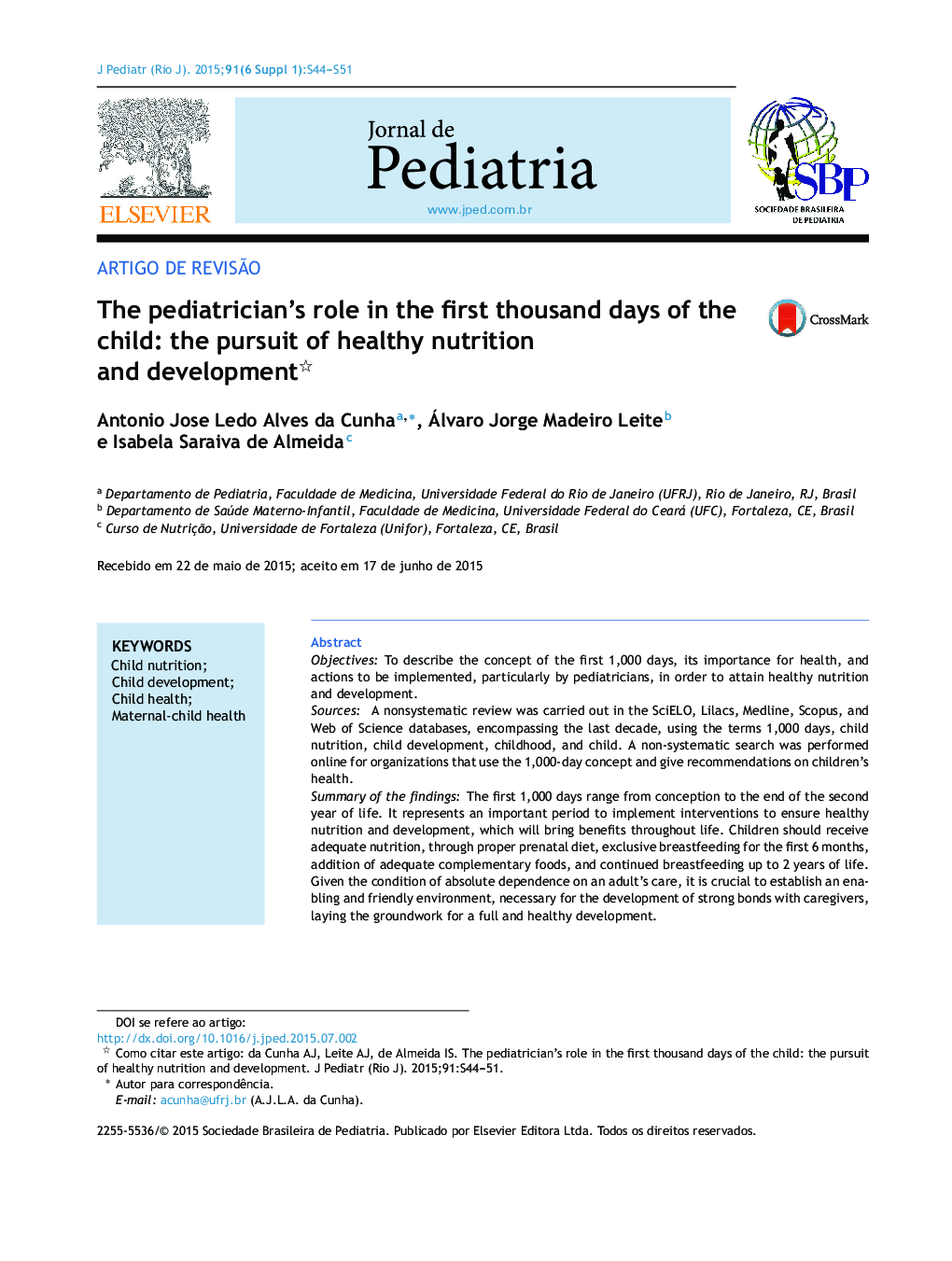| کد مقاله | کد نشریه | سال انتشار | مقاله انگلیسی | نسخه تمام متن |
|---|---|---|---|---|
| 4154337 | 1273705 | 2015 | 8 صفحه PDF | دانلود رایگان |
ObjectivesTo describe the concept of the first 1,000 days, its importance for health, and actions to be implemented, particularly by pediatricians, in order to attain healthy nutrition and development.SourcesA nonsystematic review was carried out in the SciELO, Lilacs, Medline, Scopus, and Web of Science databases, encompassing the last decade, using the terms 1,000 days, child nutrition, child development, childhood, and child. A non‐systematic search was performed online for organizations that use the 1,000‐day concept and give recommendations on children's health.Summary of the findingsThe first 1,000 days range from conception to the end of the second year of life. It represents an important period to implement interventions to ensure healthy nutrition and development, which will bring benefits throughout life. Children should receive adequate nutrition, through proper prenatal diet, exclusive breastfeeding for the first 6 months, addition of adequate complementary foods, and continued breastfeeding up to 2 years of life. Given the condition of absolute dependence on an adult's care, it is crucial to establish an enabling and friendly environment, necessary for the development of strong bonds with caregivers, laying the groundwork for a full and healthy development.ConclusionsThe pediatrician, together with other professionals, can act by promoting actions emphasizing the concept of the first 1,000 days to ensure healthy nutrition and development. Focusing on actions in this period may increase the child's chance of having a healthy and productive life in the future, strengthening family and community ties, helping to break the intergenerational cycle of poverty.
ResumoObjetivosDescrever o conceito dos primeiros mil dias, sua importância para a saúde e ações a serem implantadas, em especial pelos pediatras, para que a criança alcance nutrição e desenvolvimento saudáveis.Fonte dos dadosRevisão não sistemática nas bases SciELO, Lilacs, Medline, Scopus e Web of Science nos últimos dez anos com os termos mil dias, nutrição infantil, desenvolvimento infantil, infância, criança. Busca não sistemática na Internet de organizações que adotam o conceito dos mil dias e emitem recomendações sobre a saúde da criança.Síntese dos dadosOs primeiros mil dias vão da concepção até o fim do segundo ano de vida. É um importante período para intervenções que garantam nutrição e desenvolvimento saudáveis, que trarão benefícios em todo o ciclo de vida. As crianças devem receber alimentação adequada, por meio de nutrição pré‐natal adequada, aleitamento materno exclusivo nos primeiros seis meses, adição de alimentos complementares adequados e continuação da amamentação até os dois anos. Face à condição de dependência absoluta de cuidados de um adulto, é fundamental que tenham um ambiente propício e acolhedor necessário para desenvolver laços fortes com seus cuidadores e lançar as bases para um desenvolvimento pleno e saudável.ConclusõesO pediatra, junto com outros profissionais, pode atuar na promoção de ações com ênfase no conceito dos primeiros mil dias que garantam a nutrição e o desenvolvimento saudáveis da criança. Focalizar ações nesse período poderá aumentar as chances de a criança ter uma vida saudável e produtiva no futuro, fortalecer famílias e comunidades e contribuir para quebrar o ciclo intergeracional da pobreza.
Journal: Jornal de Pediatria (Versão em Português) - Volume 91, Issue 6, Supplement 1, November–December 2015, Pages S44–S51
